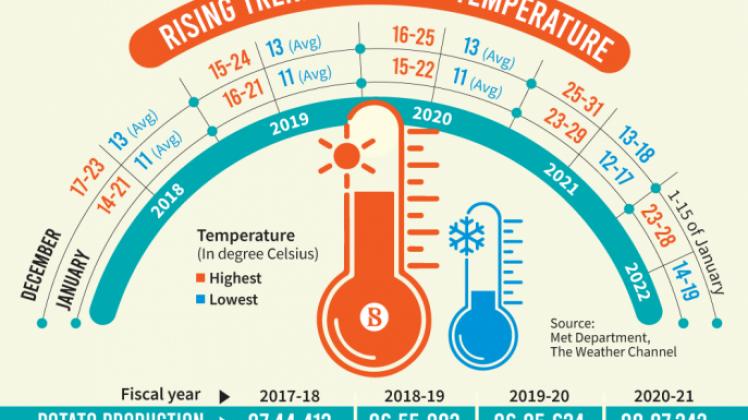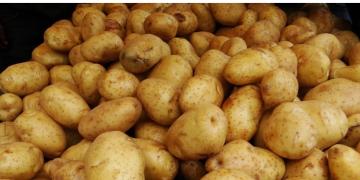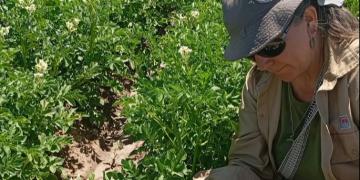Bangladesh: Milder winter may hamper potato yields
Researchers fear a drop in production in potatoes this season owing to unfavourable temperatures for the winter croppers as adverse impacts of global climate change are becoming evident.

According to the Bangladesh Agro Meteorological Information Portal, cultivating potatoes requires 18-21 degrees Celsius of temperature from planting to maturity stages. Production is hampered when the temperature rises above 25 degrees Celsius and drops below 15 degrees Celsius.
This time winter set in at least 15 days later than normal because of climate change and its intensity is less than that of the last few years.
Data from 2018-20 show that the maximum temperature in December was within 25 degrees Celsius but in 2021, it rose to 31 degrees Celsius, according to the Meteorological Department and the Weather Channel.
For the three years since 2018, the maximum temperature in January was within 22 degrees Celsius, but in 2021 and 2022, it went up to 29 and 28 degrees Celsius, respectively.
In 2021-2022, the lowest temperature in January and December also gradually increased to 17-19 degrees Celsius, which was within 14-17 degrees Celsius in the previous three years.
Dr Debashish Sarkar, director general of the Bangladesh Agricultural Research Institute (Bari), told TBS that compared to other years, the intensity of winter is less this time.
"We are monitoring the temperature because if the difference between the maximum and the lowest temperatures during the day and night is not more than 7-8 degrees Celsius, the dry matter of potatoes will be reduced and it may hamper their production."
"During the development of a new variety of potatoes, we will take into account the impacts of climate change," he added.
Shantanu Biswas, deputy project manager at Bombay Agro Limited, which produces potatoes through contract farming for the manufacture of chips, told TBS that the temperature is behaving a little differently this winter.
"Winter is not coming in full swing. It seems the temperature is at a rising level compared to that of the last few years," he said.
"If the temperature is at a rising level, the growth of potatoes will not be good. In other words, the size will be small. Because of the unfavourable temperature this winter, there is a fear that the production of potatoes will decrease," said the official at the Bombay Agro, which produces 10,000 tonnes of potatoes per year.
Late winter and sudden rains
A late winter and sudden rains in December last may seriously hamper potato production this season.
Farmers had almost completed the planting of potato seeds before December, but the mercury started falling on 29 and 30 December, according to the Met office and agriculture extension department.
The winter season in Bangladesh usually stays till February. If it departs earlier than normal this season, potato plants will not get the ideal temperature they need in their entire life span of more than 90 days up to maturity.
Meteorologist Dr Md Abdul Mannan told The Business Standard that every year the behaviour of winter has been changing in some way.
For example, this time there was heavy rain at the beginning of December, which is one of five such incidents in the last 40 years, he noted.
There is still time for the mercury to dip further, the scientist also said, adding that the temperature is expected to decrease from the beginning of January to the first week of February.
Agriculturists say if the winter ends earlier than usual, yields might drop by around 20%.
Md Khurshid Alam, deputy director at the Department of Agricultural Extension in Munshiganj, said this time the intensity and duration of winter appear to be comparatively low. Now, it remains to be seen how long it stays for those who have planted potatoes late.
Wheat production is not growing much either due to climate change, and scientists are still conducting research on discovering climate-friendly varieties.
Referring to a study by the environment department, Dr Mizanur Rahman, a professor at Rajshahi University’s Department of Geography and Environmental Studies, told TBS that every crop production requires a standard temperature, which is not available for many. Again, inconsistencies in the duration of the required temperature lead to a low growth of crops.
He said the problem of wheat and potato production in Bangladesh is very evident. Wheat production is not increasing fast in the absence of the required temperature for it. Again, potato production is declining by up to 20% due to the reduced duration of winter.
"For this we need to develop a short lifetime variety. There is no alternative," said Professor Mizanur Rahman.
According to the study, when the temperature rises by 1 degree Celsius, Aman rice is damaged in three stages from reproduction to maturity, with the yield significantly reduced.
Khairul Islam, a potato farmer in Munshiganj, has cultivated potatoes on four bighas of land. But all the potato seedlings got damaged due to rains and accumulation of water in the land caused by the cyclonic storm Jawad in the first week of December. Then he planted potatoes again a week ago.
Khairul Islam said that if winter decreases at the end of production, then potatoes will not be good and yield will be less. It is not just because of cyclones, but potatoes do not grow well either when winter gets milder.
Farmers in different parts of the country are worried about potato production as the severity of winter has been felt a little less this year, not because of planting potatoes late. This is because potato growth is directly related to changes in temperature.
Professor Dr Mohammad Abdul Baten, of the Department of Environmental Science at Bangladesh Agricultural University, Mymensingh, however, does not want to acknowledge the impact right now.
He said many of the effects of climate change are being discussed. However, it needs to be thoroughly researched. This requires at least 20-30 years of data analysis.
Md Asadullah, the outgoing director general of the Department of Agricultural Extension, told TBS that potato production would decline due to Jawad.
"Because many people have planted potatoes late. There is a risk of not getting enough winter if planted late."
According to the Meteorological Department, the effects of global climate change in the last 40 years are becoming very clear. The average temperature in Bangladesh has risen by about 1 degree Celsius during this time.
Along with the rise in temperature, sudden cyclones, heavy rains and droughts are also happening. Researchers say the agricultural sector will have to pay a heavy price as a consequence of climate change if action is not taken right away, it added.
Fuente: https://www.tbsnews.net/economy/bazaar/milder-winter-may-hamper-potato-yields-358027




